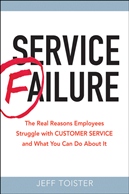Have you flown lately? Not that flying has been a picnic for sometime, but it seems to have gotten even worse. Sneaky fees, frequent delays, and surly airline workers are all conspiring to make us give Amtrak and Greyhound another look.
Failure Breeds Failure...
Lack of success can be contagious. Among the major carriers in the United States (American, United, US Air, Delta, and Continental), all posted large operating losses in the first quarter this year. Losing money doesn't feel good for employees and it will probably get worse. There are painful mergers, cut-backs, contract concessions, and the doom and gloom of an uncertain by probably negative future hanging over the employees at these airlines. Those are the lucky people. Employees at Aloha Airlines and ATA abruptly found out they didn't have jobs this past April. In short, there's nothing to be excited about.
Unfortunately, these employees are increasingly disengaged with their employers and their customers. On a recent cross-country trip, I encountered one rude employee after another. One gate agent was typing on her computer while I approached the counter so I waited patiently. She said, "Yes" in my general direction, so I held out my boarding pass that required a seat assignment. Without looking up she said, "Can I help you?" in an exasperated manner. "It's right in front of you," I said, "but I didn't want to interrupt you." "Oh, I can multi-task." Great, lucky me.
Not to be a fear monger, but I really hope the mechanics and pilots don't get too angry. This happened last week at United Airlines when a pilot reportedly became too upset to fly. Fortunately he was self-aware enough not to fly the plane anyway. Check out this bizarre story here.
Self-Reinforcing Circle
When the employees on the front lines are disengaged and providing poor service, the customers begin to get angry too. Angry travelers are a notoriously difficult, impatient, and potentially dangerous bunch. They also make it that much harder for airline employees to do their jobs. So, the airline employees get more and more frustrated and provide poorer and poorer service and the passengers get angrier and angrier. I witnessed this self-reinforcing circle time and time again throughout my travels over the past several months.
United Against, Well, United (et al)
The problem as I see it is the airlines are becoming their own worst enemies. They are making air travel less pleasant through rude employees, ticky-tack fees ($25 to check a bag, $5 for a snack pack, $2 additional to check a bag curbside), cancelling popular routes, and frequent whining about the high cost of oil. (Southwest hedged their bet on fuel prices awhile back and had an $88 million operating profit last quarter.) Even the loyalty programs breed less loyalty with fewer options, higher mileage requirements, more blackout dates, and expiring miles.
There's nothing here to root for. No passion behind the brand. And customer service ratings prove it. Epinions has the big five carriers at 3 out of 5 stars (Continental is 3.5 out of 5) and JD Power's rankings leave even more to be desired with United bringing up the rear with a 2 out of 5 rating. Yikes!
Yes, times are tough for the airlines, but what they ought to do is invite employees and passengers alike to be a part of the process. Do something to make travel easier, less stressful, even pleasurable. Create a price structure that allows you to make a fair profit, but do it in such a way that customers see the value of what they are paying for, rather than making passengers feel penalized. Stop the doom and gloom conversation with employees and invest in employee engagement initiatives.
We Need a Hero
Southwest Airlines still stands out in my mind as a positive example. Their employees are typically much more energized and friendly than other airlines. Their fares and flights are usable reasonable and convenient. They have even taken recent steps to address their Achilles heal, the boarding process, but implementing a system that virtually eliminates the dreaded cattle call. And, get this, they are still profitable.
 Jeff Toister
Jeff Toister  Wednesday, September 10, 2008 at 6:42PM |
Wednesday, September 10, 2008 at 6:42PM | 




